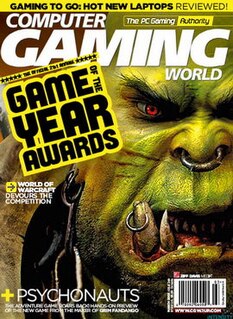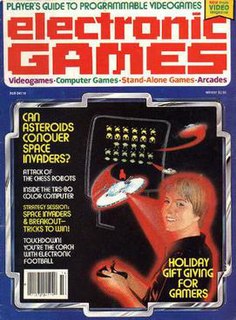This page is based on this
Wikipedia article Text is available under the
CC BY-SA 4.0 license; additional terms may apply.
Images, videos and audio are available under their respective licenses.
Heavy metal may refer to:
Issue or issues may refer to:

Computer Gaming World (CGW) was an American computer game magazine published between 1981 and 2006.

Computer and Video Games was a UK-based video game magazine, published in its original form between 1981 and 2004. Its offshoot website computerandvideogames.com was launched in 1999 and closed in February 2015. CVG was the longest-running video game media brand in the world.

Computer Games Magazine was a monthly computer and console gaming print magazine, founded in October 1988 as the United Kingdom publication Games International. During its history, it was known variously as Strategy Plus and Computer Games Strategy Plus, but changed its name to Computer Games Magazine after its purchase by theGlobe.com. By April 2007, it held the record for the second-longest-running print magazine dedicated exclusively to computer games, behind Computer Gaming World. In 1998 and 2000, it was the United States' third-largest magazine in this field.

Dennis Publishing Ltd. is an independent publisher founded in 1974.

Personal Computer World was the first British computer magazine.

Electronic Games was the first dedicated video game magazine published in the United States and ran from October 15, 1981 to 1997 under different titles. It was co-founded by Bill Kunkel, Joyce Worley, and Arnie Katz, and is not to be confused with Electronic Gaming Monthly.

Antic was a home computer magazine devoted to the Atari 8-bit family. It was named after the ANTIC chip which provided 2D graphics in the computers. The magazine was published from April 1982 until June/July 1990. Antic printed type-in programs, reviews, and tutorials, among other articles. Each issue contained one type-in game as "Game of the Month."
ANALOG Computing was an American computer magazine devoted to the Atari 8-bit home computer line, published from 1981 until 1989. In addition to reviews and tutorials, ANALOG published multiple programs in each issue for users to type in. The magazine had a reputation for listings of machine language games—much smoother than those written in Atari BASIC—and which were uncommon in competing magazines. Such games were accompanied by the assembly language source code. Originally the title as printed on the cover was A.N.A.L.O.G. 400/800 Magazine, but by the eighth issue it changed to A.N.A.L.O.G. Computing. Though the dots remained in the logo, it was simply referred to as ANALOG or ANALOG Computing inside the magazine.

Practical Computing was a UK computer magazine published monthly. The magazine was published by IPC Electrical Electronic Press Ltd. The first edition was released in August 1978 as a special computer show edition, and the second issue was October 1978. The magazine carried on to 1987 when it merged with Business Computing. In September 1989, it was renamed Management Computing.
Raffaele Cecco, born 10 May 1967, is a British video games developer who has created numerous video games since 1984, including Cybernoid and Exolon. He grew up in Tottenham in North London. Spurred by an interest in computers, he received his first computer, a Sinclair ZX81, as a birthday gift from his parents in 1981 and began programming simple games in BASIC.
SoftSide Magazine is a defunct computer magazine, begun in October 1978 by Roger Robitaille and published by SoftSide Publications of Milford, New Hampshire.

Your 64 was a British computer magazine aimed at users of the Commodore 64 and VIC-20 home computers, launched by Sportscene Specialist Press in 1984 as a sister title to Your Spectrum. Initially a bi-monthly release it later changed to monthly. The content of issues were balanced between serious and leisure features. The title lasted 14 issues until it was incorporated into Your Commodore.

The Dungeons & Dragons Computer Fantasy Game is a handheld electronic game released by Mattel in 1981.

Byte was an American microcomputer magazine, influential in the late 1970s and throughout the 1980s because of its wide-ranging editorial coverage. Whereas many magazines were dedicated to specific systems or the home or business users' perspective, Byte covered developments in the entire field of "small computers and software," and sometimes other computing fields such as supercomputers and high-reliability computing. Coverage was in-depth with much technical detail, rather than user-oriented.
Tips & Tricks was a monthly video game magazine devoted to the subjects of video game cheat codes, strategy guides and lifestyle content. Unlike most video game magazines, it did not include critical reviews of video games and was not a primary source of video game industry news. Instead, it focused on gameplay instructions and hidden "Easter eggs" relating to games that its readers might have already purchased.

Jack Schofield is a British technology journalist. He writes the Ask Jack column for The Guardian and preceding that covered technology for the newspaper from 1983 to 2010. He has edited photography and computing periodicals and produced a number of books on photography and on computing, including The Darkroom Book (1981).












